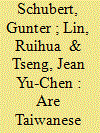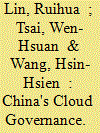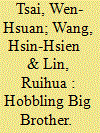|
|
|
Sort Order |
|
|
|
Items / Page
|
|
|
|
|
|
|
| Srl | Item |
| 1 |
ID:
155207


|
|
|
|
|
| Summary/Abstract |
This article applies the “strategic group” concept to Taiwanese entrepreneurs (taishang), who have businesses in both Taiwan and Mainland China, to analyze their political agency in safeguarding their collective interests. Based on extensive fieldwork, the authors look at taishang collective action in both formal and informal settings to assess whether the taishang can be considered a strategic group in contemporary cross-Strait relations.
|
|
|
|
|
|
|
|
|
|
|
|
|
|
|
|
| 2 |
ID:
183641


|
|
|
|
|
| Summary/Abstract |
The Chinese Communist Party (CCP) regime has enhanced the sharing of information between government departments through "cloud governance" using big data. Local governments have set up big data bureaus, which have created government data-sharing platforms to solve the problem of "data islands" with limited external connectivity. We use the case of COVID-19 containment and crisis management to examine how local governments in China use cloud governance to deal with special tasks, such as the maintenance of social stability, disease prevention and control, and economic recovery. We argue that the CCP's emphasis on cloud governance is part of its effort to learn new technologies in order to consolidate its rule.
|
|
|
|
|
|
|
|
|
|
|
|
|
|
|
|
| 3 |
ID:
179164


|
|
|
|
|
| Summary/Abstract |
This article argues that policy implementation in China has moved toward a system under which the center formulates a blueprint or “top-level design” from which local officials devise detailed regulations through a process of “crossing the river by feeling for stones.” This applies to the development of China’s new social credit system. To minimize political risk, when implementing it local officials have selected easier goals from the “top-level design” blueprint. In City Z, for example, we find that promoting integrity among businesses is less risky than promoting integrity among civil servants or the general public, so less progress has been made in the latter two areas when putting in place integrity credit-point systems. The risks involved in promoting social credit among the general populace are the greatest, so the city’s efforts in this have been limited. From our empirical study of China’s social credit system in City Z, we draw some conclusions about policy implementation under Xi Jinping.
|
|
|
|
|
|
|
|
|
|
|
|
|
|
|
|
| 4 |
ID:
180451


|
|
|
|
|
| Summary/Abstract |
As an authoritarian state, the Chinese government needs to adapt its policies and make them more effective in serving local development requirements. With this in mind, Xi Jinping has introduced “new-style think tanks with Chinese characteristics” capable of facilitating the formulation, introduction, and adaptation of new policies. This article uses the case of think tanks specializing in Taiwan-related issues in Fujian province to analyze how both university and private think tanks propose policies promoting local development in line with the central government’s 31 Measures for Taiwan. We analyze three areas of think tank work: policy suggestions and recommendations, surveys and information collection, and policy evaluation. We conclude that the role of Chinese think tanks is to ensure the survival of the authoritarian regime. They are not independent actors with independent sources of financial support. As policy advisers to an authoritarian state, think tanks are used by the Chinese Communist Party (CCP) to enhance its performance and refine its policies.
|
|
|
|
|
|
|
|
|
|
|
|
|
|
|
|
|
|
|
|
|